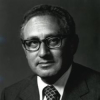Henry A. Kissinger

Henry A. Kissinger
Henry Alfred Kissingeris an American diplomat and political scientist. He served as National Security Advisor and later concurrently as United States Secretary of State in the administrations of presidents Richard Nixon and Gerald Ford. For his actions negotiating the ceasefire in Vietnam, Kissinger received the 1973 Nobel Peace Prize under controversial circumstances, with two members of the committee resigning in protest. Kissinger later sought, unsuccessfully, to return the prize. After his term, his advice has been sought by world leaders...
NationalityGerman
ProfessionStatesman
Date of Birth27 May 1923
CountryGermany
I believe that without Watergate we would have had an extraordinary period of success with a strong Nixon and a still vital Brezhnev in power.
Taiwan will probably not declare independence. The question isn't independence. The issue is whether Taiwan will declare itself as a sovereign separate state. That will start a huge crisis if that happens.
Before the Freedom of Information Act, I used to say at meetings "The illegal we do immediately. The unconstitutional takes a little longer." ... But since the Freedom of Information Act, I'm afraid to say things like that.
In my life, I have almost always been on the side of active foreign policy. But you need to know with whom you are cooperating. You need reliable partners.
Power is the ultimate aphrodisiac.
Our concern for human rights comes to the fore when there are gross violations of human decencies. Then other countries, including China, must recognize that this affects the American attitude towards their country. But towards what precise institutions will it evolve? I think we ought to leave something to history.
If you control the oil you control the country; if you control food, you control the population.
Any fact that needs to be disclosed should be put out now or as quickly as possible, because otherwise the bleeding will not end.
If eighty percent of your sales come from twenty percent of all of your items, just carry those twenty percent.
Deng Xiaoping thought of himself as a great revolutionary and a great reformer. He had dismantled the Chinese communist management of the economy. In my next-to-last conversation with him, which was about six months before Tiananmen Square, he said to me that his aim would be the next phase to reduce the Communist Party to philosophical issues. And I said, "What's a philosophical issue?" And he said, "Well, like if we make an alliance with Russia." Given his view of Russia, that was not the likeliest thing that would ever happen.
Power is the great aphrodisiac.
What we in America call terrorists are really groups of people that reject the international system
A leader who confines his role to his people's experience dooms himself to stagnation; a leader who outstrips his people's experience runs the risk of not being understood.
The nice thing about being a celebrity is that, if you bore people, they think it's their fault.